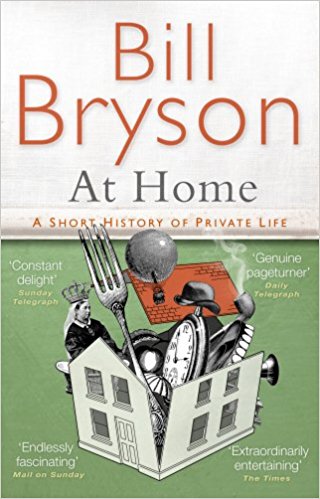At Home Summary | FREE |

6 min read ⌚
 A Short History of Private Life
A Short History of Private Life
We have already grown accustomed to reading short histories of the world told through different prisms, ranging from glasses to globalization.
In fact, Britain’s most beloved foreigner Bill Bryson has authored one of those himself – our favorite, “A Short History of Nearly Everything”.
“At Home” is even homelier. Maybe because it’s about your home. A short history of it – and each of its rooms!
Who Should Read “At Home”? And Why?
Bill Bryson writes so appealingly beautiful and hilariously funny that even if he writes about boring things, you’ll enjoy reading him! And, on the face of it, “At Home” is a book about specialists interested in sociology and anthropology, general history and the history of domestic life.
However, it can also be the book best for a good night reading. Or, an early morning one, for that matter!
About Bill Bryson
Bill Bryson is an American-born author of travel and popular science books – but you would hardly notice the former by reading his biography.
is an American-born author of travel and popular science books – but you would hardly notice the former by reading his biography.
With the exception of the first twenty years of his life, Bryson has spent almost all of it in the United Kingdom.
Unsurprisingly, since 2015, he holds a dual citizenship.
He became a British darling after publishing his 1995 travelogue, “Notes from a Small Island,” which was voted in 2003 by BBC listeners as the book which best represents Britain.
His 1998 hit, “A Walk in the Woods,” was turned into a successful movie in 2015, and “A Short History of Nearly Everything” is often hailed as one of the most accessible scientific books for the general population.
Unsurprisingly, we included it among our top 15 history books ever written!
“At Home Summary”
You think you know your house like the back of your palm?
You may be right – after all, you certainly don’t know that bats’ wings are not much different from your fingers!
We’ve already warned you once before that almost everything has evolved. Then, why should your home be any different?
And Bill Bryson’s “At Home” is an in-depth look at the evolution of every room your home has – or, at least, had at some point in history.
And the only problem we have with it is that it features so many interesting stories that we have no choice but to select merely few!
So, let’s skip the great hall you don’t have – and spend some time in the kitchen you visit at least seventeen times a day; you know, to grab a snack or numerous. In other words: it’s safe to say that you’ll find your way through the kitchen even if sleepwalking!
Now, you wouldn’t even suppose that up to very recently, putting anything in your mouth while not looking carefully may have cost your life!
Really!
They call it food adulteration, and, putting it mildly, it meant consuming gypsum and sand with your sugar, chalk with your milk, and – yes! – even sulphuric acid with your vinegar.
Fortunately, governments control this nowadays much better; but, unfortunately, the list of food contamination incidents is a way too long to be ignored still!
Any case, it’s gotten better. A lot better!
For example, when you see a “best before” date on a certain jar, you don’t doubt its exactitude! In fact, you may even eat its contents sometime after it’s passed.
Well, until a century ago, nobody in the world would dare eating anything out of a jar or a can – unless he put it there himself a few days ago!
The man who first tried to change this was a French guy, Nicolas Appert. Called the “father of canning,” he was the first to introduce glass jars.
That made things better in terms of conservation, but only because of the lack of alternatives. Air and bacteria still got through – and the food was ultimately spoilt.
Then, an Englishman by the name of Bryan Donkin had it enough! So, he experimented a while with tin canning and finally managed to manufacture in iron containers which preserved food better than anything ever before.
The problem?
The food was protected not only from bacteria but from humans too. Namely, it was almost impossible to open these containers!
So much so, that some of them came with a hammer and a chisel! And, until John Landis Mason invented the metal screw-on lid, many had to be opened up by soldiers.
Yes – with guns and bayonets!
Sticking with food – let’s have a brief look at the history of your dining room! Or, better yet, at the history of one of its constant features: the salt and pepper shakers!
Now, you certainly know that without salt you’ll probably die. Intuitively, everyone knew this ever since the dawn of history. So, countries and cultures went to great lengths to secure salt. The Aztecs, for example, dried urine to make edible salt!
Pepper, however, isn’t necessary at all! However, the Romans liked it so much, that they drove its price and status so high, that nobody ever since has bothered to question its importance.
On the contrary, in fact!
In 1468, the Duke Karl of Bourgogne ordered about 400 pounds of pepper as a wedding decoration! Just to show off his wealth!
Key Lessons from “At Home PDF”
1. Everything You Have at Home Has a Long History
2. Good Night, Sleep Tight, Don’t Let the Bedbugs Bite
3. Dirty Much? Just Say That You Want to Be Closer to God
Everything You Have at Home Has a Long History
We are constantly aware that some of the big things we’ve inherited came by way of an ardently long evolution. However, rarely do we wonder if the same holds true about the jars in our cupboard, or the salt and pepper shakers on our dining table.
Bill Bryson has wondered in our stead. And in “At Home” he manages to tell the fascinating histories of some very small objects at our home. Just as he did when he retold us the whole history of everything big in our universe.
Good Night, Sleep Tight, Don’t Let the Bedbugs Bite
How many times have you heard that, right?
Sure, it sounds gentle and beautiful now – but just ask your great-great-great-great-grandparents! Because, to them, this wasn’t merely a phrase: it was a serious warning!
Because, first of all, their bed was stuffed with everything – dead or alive! And, because, secondly, bedbugs were the least of their problems! Many people, in fact, went to sleep with their shoes beside them – so that they can use them as a weapon against the little monsters in the bed.
Yes, there were rats too!
Dirty Much? Just Say That You Want to Be Closer to God
Now, for long periods of history, bed hygiene wasn’t really a priority! And that’s because – the opposite was: keeping yourself dirty.
For example, Saint Thomas Beckett and Saint Godric became saints because, well, they didn’t bathe! Dirt, the Christians believed, made them closer to nature, and with it – to its Creator, God.
Even if it’s so – we think we’ll pass.
Like this summary? We’d like to invite you to download our free 12 min app, for more amazing summaries and audiobooks.
“At Home Quotes”
I refer of course to the soaring wonder of the age known as the Eiffel Tower. Never in history has a structure been more technologically advanced, materially obsolescent, and gloriously pointless all at the same time. Share on X Even though sugar was very expensive, people consumed it till their teeth turned black, and if their teeth didn't turn black naturally, they blackened them artificially to show how wealthy and marvelously self-indulgent they were. Share on X It is always quietly thrilling to find yourself looking at a world you know well but have never seen from such an angle before. Share on X And it occurred to me, with the forcefulness of a thought experienced in 360 degrees, that that's really what history mostly is: masses of people doing ordinary things. Share on X If a potato can produce vitamin C, why can't we? Within the animal kingdom only humans and guinea pigs are unable to synthesize vitamin C in their own bodies. Why us and guinea pigs? No point asking. Nobody knows. Share on X
Our Critical Review
As its bibliography reveals, “At Home” is one of the many books covering the history of domestic life. However, the fact that Bill Bryson is so good with witty anecdotes and arcane facts makes this “quirky history” a joy to read. Or, as a Telegraph reviewer wrote soon after its publication, “a treasure.”







